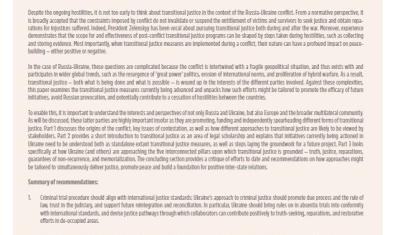The Complementarity Turn: Domestic Justice in the Shadow of International Criminal Tribunals
Event


OUP
International criminal justice is still reflexively associated with high-profile international cases, such as the International Criminal Court (ICC)’s recent arrest warrant against Vladimir Putin. However, whether it be in Ukraine, Colombia or the Democratic Republic of Congo, national courts now prosecute far more suspects for war crimes, crimes against humanity and genocide. Not only does the ICC play a backup role in these and many other countries, but its track record of just a handful of convictions over a twenty-year period stands in stark contrast to the former tribunals for Rwanda and Yugoslavia, which prosecuted hundreds of cases in the same amount of time.
How did domestic accountability come to eclipse the dream of international criminal tribunals? And what are the effects of this shift from international to domestic trials for the global fight against impunity? In his new book, International Criminal Tribunals and Domestic Accountability. In The Court’s Shadow, Patryk Labuda examines the causes, rationales and consequences of the complementarity turn – a paradigm shift toward national trials as the ultima ratio or end goal of international criminal justice. While domestic justice is now celebrated as superior to proceedings in The Hague, Labuda encourages us to reflect more critically on the cliché that ‘the future of international criminal justice is domestic’, and points to the ongoing debates over the interplay of domestic, international and hybrid trials in Ukraine as evidence that the merits and drawbacks of both international and national accountability initiatives require further study.
Moderation
- Robert Roth, Emeritus Professor, University of Geneva Law Faculty
Panelists
- Patryk Labuda, Author of the book and Fellow, Institute of Law Studies, Polish Academy of Sciences
- Michelle Jarvis, Deputy Head of the International, Impartial and Independent Mechanism for Syria
- Kate Gibson, Defence Counsel before various international criminal tribunals, including the ICC.
Get Ready: Relevant Links
In this blog post, Patryk Labuda presents his book's arguments.
Drinks
This book launch will be followed by drinks and the book will be on sale.
Disclaimer
This event may be filmed, recorded and/or photographed on behalf of the Geneva Academy. The Geneva Academy may use these recordings and photographs for internal and external communications for information, teaching and research purposes, and/or promotion and illustration through its various media channels (website, social media, newsletters, annual report, etc.).
By participating in this event, you are agreeing to the possibility of appearing in the aforementioned films, recordings and photographs, and their subsequent use by the Geneva Academy.





